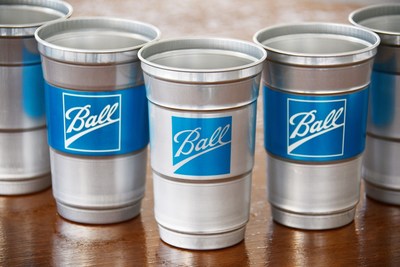Ball Corporation to Build New Aluminum Cups Manufacturing Plant in Georgia
October 16, 2019
BROOMFIELD, Colo., Oct. 16, 2019 /PRNewswire/ -- Ball Corporation (NYSE:BLL) announced today that it will begin construction on its first dedicated aluminum cups manufacturing facility to serve the growing demand for innovative, sustainable beverage packaging for U.S. customers and consumers.

The new aluminum cups manufacturing facility will be adjacent to Ball's existing aluminum beverage can manufacturing plant in Rome, Georgia, and is expected to ramp up production in the fourth quarter of 2020. Ball plans to hire approximately 145 new employees for the cups facility to support the multi-year investment of approximately $200 million. Atlanta-based KBD Group Inc. is serving as general contractor on the project.
"We're increasingly hearing from customers and consumers that they want to do the right thing for the environment, and they need more options," said John A. Hayes, chairman, president and chief executive officer. "This product launch is aligned with our Drive for 10 strategy and is another step in innovating to serve unmet needs. Using our years of experience and specialized expertise, we are proud to provide both our customers and consumers with another environmentally friendly and fun option in our industry-leading portfolio of aluminum packages."
In addition to its sustainability and recycling strengths, the aluminum cup is sturdy, durable, cool to the touch, and provides an elevated drinking experience. It also can be customized with logos and graphics. The cup is currently available through a limited pilot program with major venues and concessionaires across the U.S. in a 20-ounce size produced in Ball's Westminster, Colorado, innovation facility. When the Rome plant is fully operational, Ball plans to introduce additional sizes to round out its cups portfolio and intends to expand adoption of the cups to drinking establishments, parks and recreation, colleges and universities, hospitality, restaurants, business and industry.
Infinitely recyclable and economically valuable, aluminum is the most sustainable beverage packaging material, and aluminum cans, bottles and cups are easily recycled. In fact, 75 percent of the aluminum ever produced is still in use today. Ball's research shows that 67 percent of U.S. consumers say they will visit a venue more often if they use aluminum cups instead of plastic cups and that 78 percent of consumers expect beverage brands to use environmentally friendly containers in the next five years.
For more information, please visit www.ball.com/cups.
About Ball Corporation
Ball Corporation supplies innovative, sustainable aluminum packaging solutions for beverage, personal care and household products customers, as well as aerospace and other technologies and services primarily for the U.S. government. Ball Corporation and its subsidiaries employ 17,500 people worldwide and reported 2018 net sales of $11.6 billion. For more information, visit www.ball.com, or connect with us on Facebook or Twitter.
Forward-Looking Statements
This release contains "forward-looking" statements concerning future events and financial performance. Words such as "expects," "anticipates," "estimates," "believes," "targets," "likely," "positions" and similar expressions typically identify forward-looking statements, which are generally any statements other than statements of historical fact. Such statements are based on current expectations or views of the future and are subject to risks and uncertainties, which could cause actual results or events to differ materially from those expressed or implied. You should therefore not place undue reliance upon any forward-looking statements and any such statements should be read in conjunction with, and, qualified in their entirety by, the cautionary statements referenced below. The company undertakes no obligation to publicly update or revise any forward-looking statements, whether as a result of new information, future events or otherwise. Key factors, risks and uncertainties that could cause actual outcomes and results to be different are summarized in filings with the Securities and Exchange Commission, including Exhibit 99 in our Form 10-K, which are available on our website and at www.sec.gov. Additional factors that might affect: a) our packaging segments include product demand fluctuations; availability/cost of raw materials and logistics; competitive packaging, pricing and substitution; changes in climate and weather; footprint adjustments and other manufacturing changes, including the startup of new facilities and lines; failure to achieve synergies, productivity improvements or cost reductions; mandatory deposit or other restrictive packaging laws; customer and supplier consolidation; power and supply chain interruptions; potential delays and tariffs related to the U.K's departure from the EU; changes in major customer or supplier contracts or a loss of a major customer or supplier; political instability and sanctions; currency controls; changes in foreign exchange or tax rates; and tariffs, trade actions, or other governmental actions in any country affecting goods produced by us or in our supply chain, including imported raw materials, such as pursuant to Section 232 of the U.S. Trade Expansion Act of 1962 or Section 301 of Trade Act of 1974; b) our aerospace segment include funding, authorization, availability and returns of government and commercial contracts; and delays, extensions and technical uncertainties affecting segment contracts; c) the company as a whole include those listed plus: the extent to which sustainability-related opportunities arise and can be capitalized upon; changes in senior management; regulatory action or issues including tax, environmental, health and workplace safety, including U.S. FDA and other actions or public concerns affecting products filled in our containers, or chemicals or substances used in raw materials or in the manufacturing process; technological developments and innovations; litigation; strikes; labor cost changes; rates of return on assets of the company's defined benefit retirement plans; pension changes; uncertainties surrounding geopolitical events and governmental policies both in the U.S. and in other countries, including the U.S. government elections, budget, sequestration and debt limit; reduced cash flow; interest rates affecting our debt; and successful or unsuccessful joint ventures, acquisitions and divestitures, including with respect to the Rexam PLC acquisition, its integration, the associated divestiture, and their effects on our operating results and business generally.

SOURCE Ball Corporation

